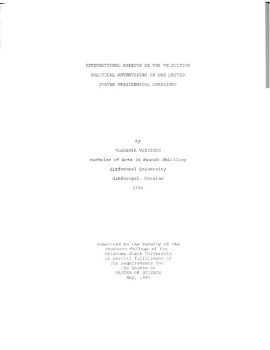| dc.description.abstract | Politics and media have long been closely related and although electoral campaigns continue to use newspapers, radio, and other traditional campaign media and adopted the Internet in the 1996 campaign, it is television that has become in the recent decades the dominant medium in an effort to win any political campaign and the presidential race in particular. Television is commonly considered basic to contemporary American politics. A common stereo type in presidential elections is that the key to winning office is an appealing and convincing television advertising. An analysis of campaign spending shows that the most significant part of a candidate's expenditures goes to produce and air television commercials. Many researchers have demonstrated that such advertisements have significant voter effect. A great number of research studies that have been done in the field of political advertising show that televised political advertisements can be a serious vehicle for setting the agenda of the electoral campaigns. There is little reason, if any, to argue that political advertising has, indeed, become a major means by which candidates for the presidency communicate their messages to voters. Unlike television news or political programs, advertising can be controlled by candidates themselves and enable them to frame the questions they view as central to a particular election campaign and expose their personal qualities and agenda for the future in a favorable light . Moreover, political advertising campaigns on television have brought forth a totally new format of journalism called journalist adwatches. Adwatch journalism has become a substantial and ever growing part of presidential campaigns coverage in both print and broadcast media and has attracted interest of many scholars. Televised political commercials in the presidential campaigns date back to 1952 when Republican candidate Dwight Eisenhower appeared in a series of advertisements called "Eisenhower Answers America." Ever since the first appearance o f political advertising on TV, international issues, along with domestic ones, have become a substantial part o f the television advertising campaigns of presidential candidates . In fact, Eisenhower himself became known and popular first of all due to his outstanding role in the World War II--a major world conflict. It seems of interest, therefore, to explore what place international or foreign affairs issues have occupied in the television political advertising during presidential campaigns in the U.S. starting from the 1952 presidential election up until the last one in 1996. | |
